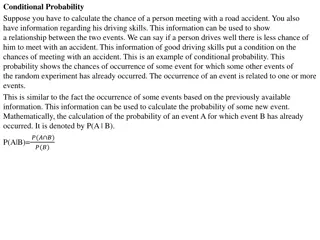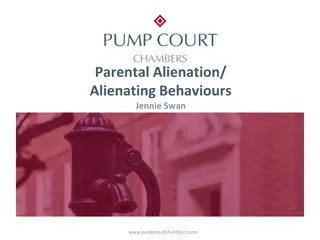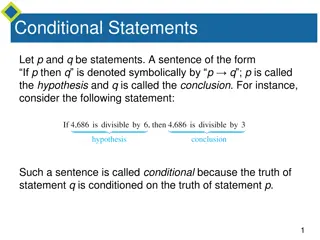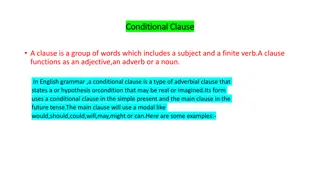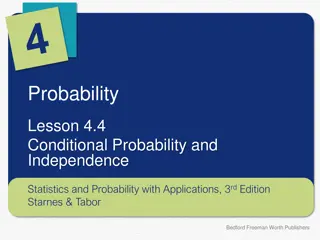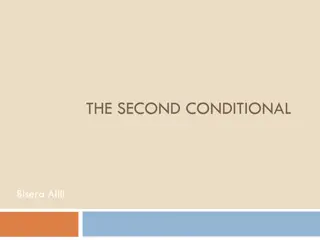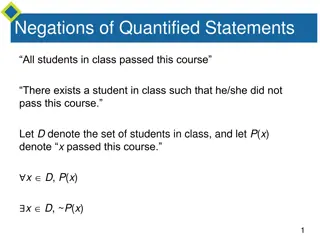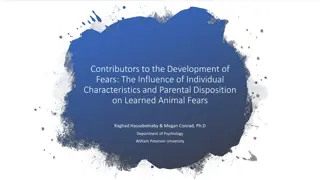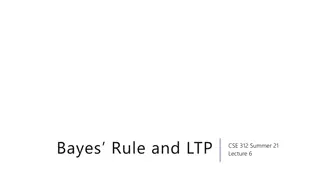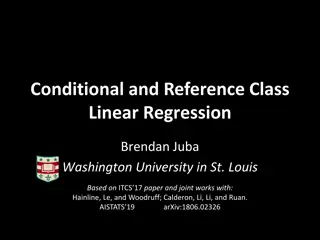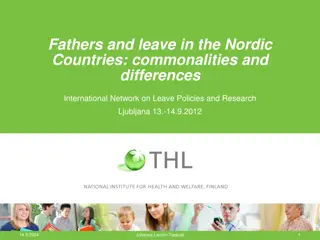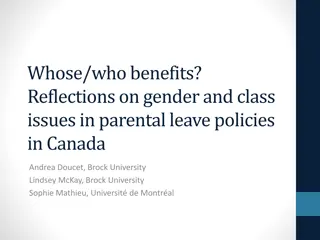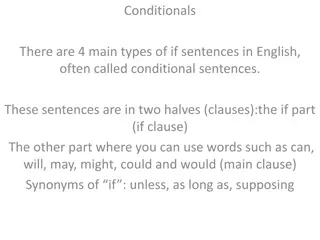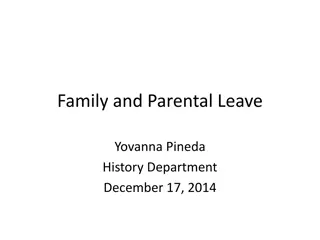Impact of Parental Conditional Regard on Self-Regard Development
The impact of parental conditional regard (PCR) on self-regard development is significant, affecting authenticity and the ability to form a true self. PCR involves parents showing affection and appreciation based on the child's adherence to specific expectations, leading to negative psychological outcomes like shame and low self-esteem. This practice can hinder the individual's regulatory process, causing a reliance on external validation and impeding the formation of unconditional positive self-regard (UPSR) essential for personal growth and fulfillment.
- Parental Conditional Regard
- Self-Regard Development
- Psychological Outcomes
- Authenticity
- Unconditional Positive Self-Regard
Download Presentation

Please find below an Image/Link to download the presentation.
The content on the website is provided AS IS for your information and personal use only. It may not be sold, licensed, or shared on other websites without obtaining consent from the author. Download presentation by click this link. If you encounter any issues during the download, it is possible that the publisher has removed the file from their server.
E N D
Presentation Transcript
HomeButton.png Unconditional positive self- regard: The impact of perceived parental conditional regard Carmel Proctor, Daniel Morris, Roger Tweed, & Samantha Duncan International Network on Personal Meaning Vancouver August, 2018
HomeButton.png Carl Rogers: Person-Centered Psychology All human beings have an inbuilt tendency towards fulfillment and growth Motivational system the actualizing tendency Regulatory system the organismic valuing process Feedback from the regulatory system keeps an organism attuned with satisfying motivational needs Awareness of the self occurs through interaction with the environment As awareness of the self emerges, individuals naturally develop the need for positive regard
HomeButton.png Unconditional Positive Self-Regard Positive self-regard develops from a positive regard satisfaction associated with a particular self-experience or group of self-experiences independent of the positive regard of others i.e., positive regard has been experienced from others, which results in a positive attitude towards oneself in general, that is no longer directly dependent on the regard of others Unconditional positive self-regard (UPSR) is experienced when an individual perceives themselves in such a way that no self-experience can be discriminated as more or less worthy of positive regard than any other
HomeButton.png Condition of Worth When self-experiences with significant others are discriminated as being more or less worthy of positive regard, individuals develop conditions of worth i.e., self-experiences are avoided or sought solely because they are more or less worthy of self-regard Conditions of worth disturb the organismic valuing process, preventing individuals from functioning freely or being their true self Consequently, values become introjected taken over from others and applied to experiences without consideration of whether they maintain or enhance the organism i.e., experiences may be perceived as organismically satisfying, when they are not and vice versa
HomeButton.png Parental Conditional Regard Parental conditional regard (PCR) is a socializing practice in which parents make their affection and appreciation contingent on the child s display of parentally desired behaviors i.e., more affection, attention, and appreciation are displayed when children act in accordance to specific parental expectations and less affection and esteem (ignored/rejected) when children to not act in accordance to specific parental expectations PCR is associated with a host of negative psychological outcomes negatively impacting authenticity and ability to develop a true self PCR reliably establishes the display of the target behavior, but associated with negative affective consequences (shame, low self-esteem/self-worth, resentment towards parents, poor coping skills)
HomeButton.png Study Purpose: To test the following predictions based on the person-centered model: Increased UPSR will be associated with increased self-esteem and decreased depression and anxiety 1. Increased UPSR will be associated with authentic living, life satisfaction, and intrinsic motivation and decreased self-alienation and accepting external influence 2. Increased UPSR will be associated with decreased perceived parental conditional regard 3.
HomeButton.png Study Hypotheses: Hypothesis 1: Emotional self-assessments (i.e., depression, anxiety, and self- esteem) can predict unconditional positive self-regard Hypothesis 2: Humanistic/positive psychology constructs (i.e., authenticity, life satisfaction, aspirations) can predict unconditional positive self-regard, and account for significant variability not accounted for in emotional self- assessments Hypothesis 3: Perceived parental conditional regard can predict unconditional positive self- regard, and accounts for significant variability not accounted for in emotional self- assessments and humanistic/positive psychology constructs
HomeButton.png Study Method: Participants: 355 young adults aged 16-19 (100 males, 255 females). The mean age of participants was 16.87 years (SD = .819) Measures: RSE: Rosenberg Self-Esteem Scale AS: Authenticity Scale SLSS: Students Life Satisfaction Scale AI: Aspiration Index UPSR: Unconditional Positive Self-Regard PHQ-9: Patient Health Questionnaire GAD-7: Generalized Anxiety Disorder PPCR: Perceptions of Parental Conditional Regard Scale Four domains: Emotional Control, Prosocial Behavior, Academic, Sport Procedure: Online data collection Data Analysis: Hierarchical regression assessed unique variability in UPSR accounted for by three blocks of predictor variables (i.e., emotional self-assessments, humanistic/positive psychology constructs, and PPCR)
HomeButton.png Results: Each block of variables added significantly to variance accounting for UPSR, with block 1 accounting for the most variance and 2 and 3 progressively less Block 1: Self-Esteem only individual significant predictor Block 2: Authentic Living and Life Satisfaction significant positive predictors of UPSR and Accepting External Influence and Importance of Intrinsic Motivation significant negative predictors of UPSR Block 3: Perceived Parental Conditional Regard of Academic Success at school significant positive predictor of UPSR. Prosocial Behavior approached significance as a negative predictor of UPSR
HomeButton.png Discussion: Block 1: results consistent with hypotheses for self-esteem, depression, and anxiety directionality consistent with hypotheses Block 2: results consistent with hypotheses for authentic living, accepting external influence, life satisfaction, and importance of intrinsic motivation. Self-alienation non-significantly positively associated with UPSP, when expected as significant negative predictor. Block 3: results consistent with hypotheses for prosocial behavior directionality for sport, emotional control, and academic success (only significant predictor) not consistent with hypotheses, all positively associated
HomeButton.png Conclusion: Overall, results of Block 3 suggest individuals with increased UPSR engage positively with others and therefore may be less negatively impacted by conditional regard of their intrinsically motivated behavior i.e., significant positive associations with self-esteem, life satisfaction, authentic living, and importance of intrinsic motivation, may have acted as a buffer against the negative impact of PCR Research supports benefits of autonomy-supportive parenting i.e., young adults who perceive their parents as understanding their perspective and providing meaningful rational, choose to act without the accompanying negative feelings Possible that the best outcomes for youth occur when parents can be warm, supportive, and have high expectations Current research study suggests there can be significant positive relations between PCR and positive outcomes
HomeButton.png Thank you!
HomeButton.png Reference: Proctor, C., Morris, D., Tweed, R., & Duncan, S. (in press). Unconditional positive self-regard: The impact of parental conditional regard. Journal of Humanistic Psychology, submitted.



